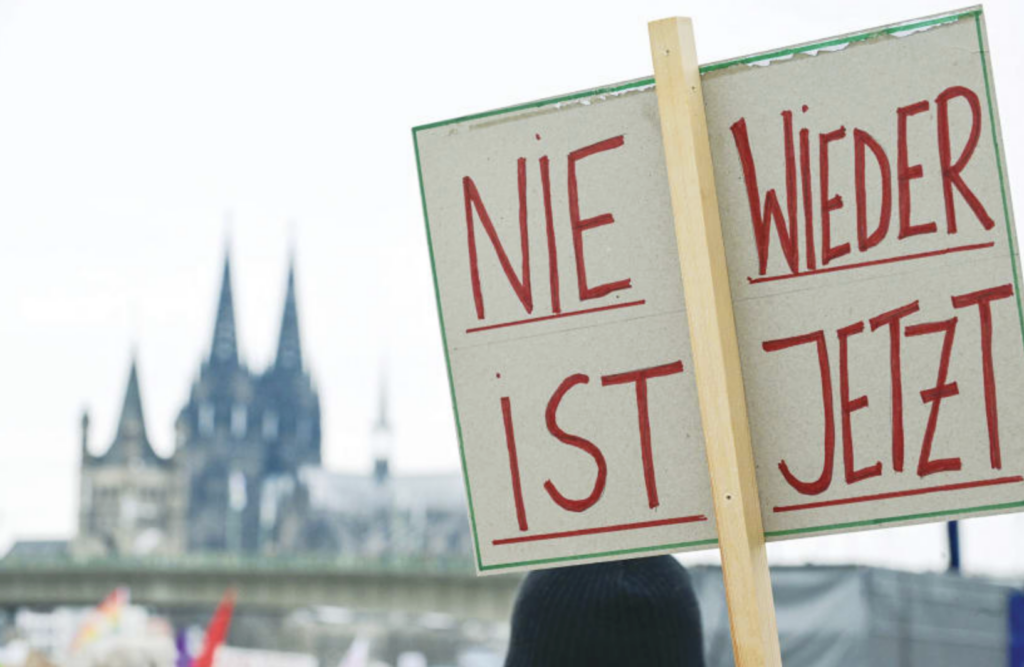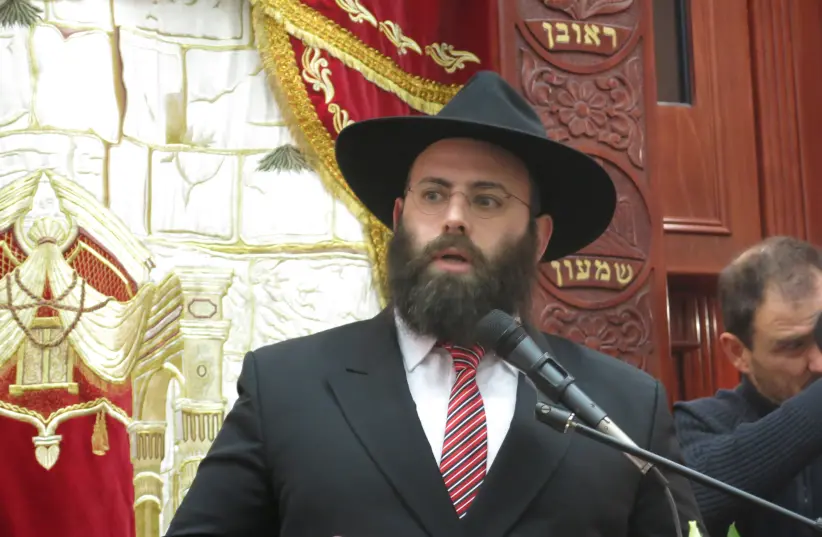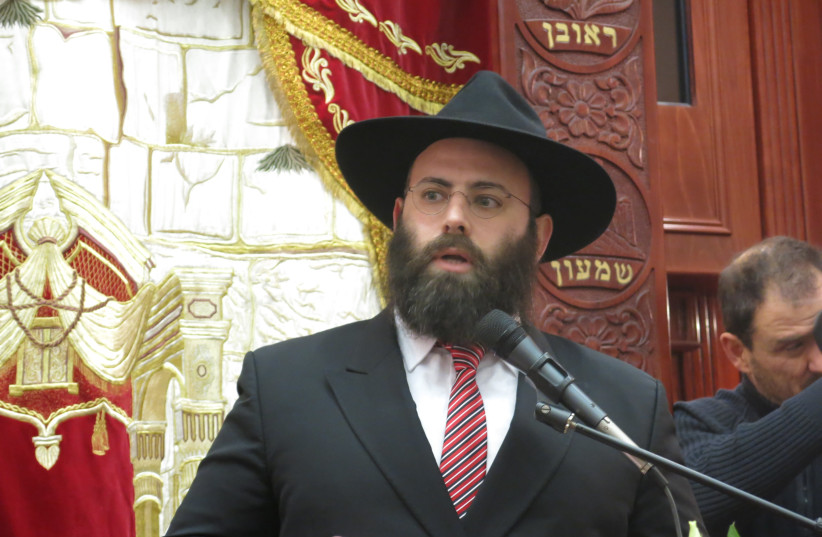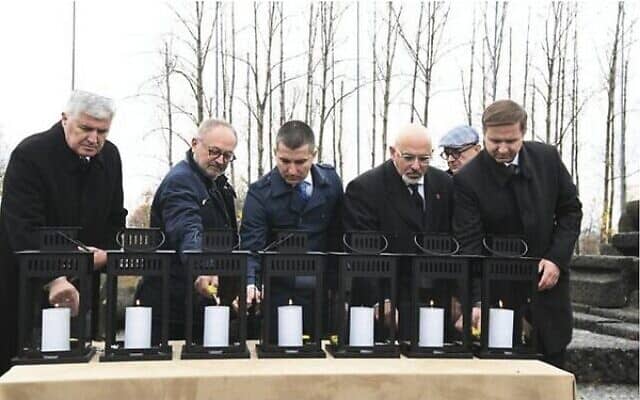
What exactly do they mean? No more concentration camps? No more mass murder? One would certainly hope so, given Europe’s turbulent and bloody treatment of the Jewish people.
And what about never allowing the circumstances that led to these barbaric and inhuman manifestations of hate to happen again? Does “Never again” mean that too?
The Jewish communities across Europe certainly thought so. It appears that we were laboring under a misapprehension, brought into vivid and stark relief in the aftermath of October 7.
Since the Hamas pogrom, reported cases of antisemitism have gone through the roof – in the UK, Spain, and France the percentage rise is over 1000%. Today, as I write this, Jews are facing levels of antisemitism last seen in 1939 in Nazi Germany.
This is an unbelievable and incredible sentence to have to write.
Things were already bad. Like a dormant volcano before October 7 , there were regular tremors and some eruptions, but we hoped for the best. The war awoke it. Jewish Communities are daily facing molten streams of hate everywhere across the continent.
In Holland, earlier this year, they canceled Holocaust Remembrance Day events at universities over security concerns and because of vociferous opposition to the memorializing. Just recently, in Amsterdam, there were protests at the opening of a new Holocaust museum.
Rabbis are slapped in the street and verbally abused. In capitals across the continent – mainly in those with significant Muslim populations – there are regular protests displaying Nazi images referring to Jews, images drawing parallels between Gaza and Auschwitz, and you can hear calls for Jewish genocide and ethnic cleansing “From the river to the sea.” You can read placards calling Jews terrorists, and the blood libel of “child killers” is regularly used.
Death threats against rabbis are common. Jews are insulted on the street on a daily basis and our children cursed at.
Those European citizens who have served in the IDF are outed in their communities through letter campaigns pointing out that a “child killer” is living next to them; flights arriving from Israel are tracked and met by protesters.
The Jewish community president in Porto takes his child to nursery wearing a bulletproof vest. The principal Jewish organizations here in Belgium have had to write to their prime minister, urging him not to abandon them.
A Brussels commune, in which NATO HQ is located, just this week raised the Palestinian flag above their town hall.
To paraphrase Nietzsche, as Israel stared into the abyss, Jews in Europe have seen the abyss staring back at them in their neighborhoods in London, Paris, Madrid, and Brussels. Just because they are Jews.
At least Israel can fight back. What can we do? We place our lives and our trust in the hands of our respective governments. Are we right to do so? Let’s take a minute to look at the evidence.
Back in 2021, amidst a spike in COVID-related antisemitism, the EU published a detailed strategy for combating antisemitism. The strategy was handed over to the member states, and they in turn were to adopt measures and develop national plans for combating antisemitism. Many did. A great many also signed up to the IHRA definition of antisemitism, patting themselves on the back.
But any strategy must ultimately pass the test in the real world. So how have these strategies, plans, and IHRA adoption held up upon meeting the post-October 7 landscape from what you have read so far?
That’s right. They have no visible or demonstrable practical application across Europe today. Or to put it as eloquently and simply as a Dutch Jewish community president put it: “They are not worth the paper they are printed on.”
The reality is that police departments are hamstrung at openly antisemitic protests, unsure and therefore unable to stop public manifestations of hate and overt antisemitism.
A swastika is allowed because it is “context-dependent”; “From the river to the sea” is allowed in some capitals, because it isn’t explicit enough to count as hate speech. (Would they just prefer “Burn, Jew, burn”?).
The courts too, seem to have little to no frameworks available to prosecute the anti-Zionists and antisemites who are making our collective Jewish life here in Europe hell.
And these Jew-haters are emboldened because they can act with total impunity. They simply moved the goalposts and – when they can be bothered – have just replaced Jew with Zionist, thereby rendering the vast majority of Jews in Europe as the Azazel for their hate. It must be such a relief for them to finally give air to their sulphurous pent-up poison.
As I write this, an image from a community in Dortmund has just popped up on WhatsApp. It shows a large graffiti of a Star of David with a swastika inside it.
Never again? If European governments are not prepared or are unwilling to turn words into action, these important words will have just been a platitude. And an insulting one at that.
The writer is chairman of the European Jewish Association, which represents hundreds of Jewish communities across the continent.
https://www.jpost.com/opinion/article-796594

As Belgium joins the latest countries to go into lockdown due to the coronovirus, we would like to take this opportunity to wish you all well, that your families and loved ones may remain safe and healthy and that the outbreak will be over quickly. In the meantime, Shabbat Shalom and stay positive and strong.

“The history of the Jewish people is one of displacement, either because of pogrom or war,” said Rabbi Menachem Margolin, EJA chairman. “We are only too aware of what it means to be forced to up and leave at a moment’s notice. In almost every one of our communities you will hear such stories. We, the Jewish people, are especially attuned to these catastrophes. And because we are so attuned, we are pre-programmed to help our Jewish neighbors, just as we always have.
“I have faith that this campaign will deliver. Since the war started, Jews from all over Europe have been getting in touch with us to see what can be done to help their Ukrainian Jewish brothers and sisters in need. We are providing them with the vehicle to do just that, by offering shelter, food and clothing to those who left in a hurry, often with nothing but the clothes on their backs.”

Another European Jewish organization very active on the ground is the Conference of European Rabbis, which announced this week that Israeli technology investor Yuri Milner has donated $3 million to the CER to help Jewish refugees from Ukraine.
“As we witness the terrible human suffering in Ukraine, the Conference of European Rabbis would like to announce a special donation of $3m. from the foundation established by Yuri and Julia Milner,” said the conference. “Yuri is an Israeli technology investor and science philanthropist.”
The emergency funds will support humanitarian efforts to help Jewish refugees from Ukraine who, like so many vulnerable civilians, are in need of urgent assistance.
“The CER is grateful to Yuri and Julia Milner for their long-standing support and for this latest commitment to the Jewish community at this perilous time,” said CER President Chief Rabbi Pinchas Goldschmidt.
https://www.jpost.com/diaspora/article-700758?fbclid=IwAR2yLD2JGbS7tCP5k3V7SblC-mEcqpkkWByXPlxN0m8H2x8xnW0K8kTcsLs

EUROPEAN lawmakers and Jewish communal figures commemorated the 83rd anniversary of Kristallnacht during a ceremony at Auschwitz on Tuesday, calling for enduring memory and education to counter the forces of hatred.
Capping off a conference on antisemitism organised by the European Jewish Association, the delegation – including representatives of more than two dozen countries – held a short candlelighting ceremony, before laying wreaths at the “death wall” where thousands of inmates were killed by firing squad.
“On this day exactly 83 years ago, hundreds of Jews were murdered, fathers, mothers, children, by my countrymen, in my country,” said Stefanie Hubig, the education minister for the German state of Rhineland-Palatinate. “Synagogues and prayer houses were set on fire, Jewish cemeteries were devastated. Countless people were arrested and deported to Nazi concentration camps.”
Hubig added, “There is still antisemitism in Germany, and I am ashamed of it, deeply”
Igor Zorcic, president of the Slovenian National Assembly, referenced more recent atrocities in his remarks.
“Unfortunately, present times do not always prove that our promises of ‘never again’ are entirely sincere,” he said. “Remember Srebrenica – and don’t underestimate the seriousness of the current political friction over genocide.”
He was referring to the 1992 massacre at Srebrenica in Bosnia and Herzegovina, where 7000 Bosnian Muslim boys and men were slaughtered by Serbian forces.
Addressing the delegation in Krakow a night earlier, Rabbi Yisrael Meir Lau, chairman of Yad Vashem and a Holocaust survivor, said Kristallnacht underlined how much the world is willing to ignore human suffering.
“[Kristallnacht] was a test to humanity, to all the nations, to all the globe, how would they react,” said the former chief rabbi of Israel. “In my eyes it was a test,” he said, noting how little international outcry followed.
“Ask in your cities, in the archives, for the newspapers of November 10, 11 and 12, 1938: What is written in the newspapers about Kristallnacht? Almost nothing.”
https://www.australianjewishnews.com/remembrance-at-auschwitz/
It’s a challenging time for Jewish communities in Europe. Anti-Semitism is on the rise as populism and the politics of the lowest common denominator are gaining traction. Our communities often need round the clock protection and our practices and customs such as keeping Kosher are under pressure from increasing political interference.
| Cookie | Duration | Description |
|---|---|---|
| cookielawinfo-checkbox-analytics | 11 months | This cookie is set by GDPR Cookie Consent plugin. The cookie is used to store the user consent for the cookies in the category "Analytics". |
| cookielawinfo-checkbox-functional | 11 months | The cookie is set by GDPR cookie consent to record the user consent for the cookies in the category "Functional". |
| cookielawinfo-checkbox-necessary | 11 months | This cookie is set by GDPR Cookie Consent plugin. The cookies is used to store the user consent for the cookies in the category "Necessary". |
| cookielawinfo-checkbox-others | 11 months | This cookie is set by GDPR Cookie Consent plugin. The cookie is used to store the user consent for the cookies in the category "Other. |
| cookielawinfo-checkbox-performance | 11 months | This cookie is set by GDPR Cookie Consent plugin. The cookie is used to store the user consent for the cookies in the category "Performance". |
| viewed_cookie_policy | 11 months | The cookie is set by the GDPR Cookie Consent plugin and is used to store whether or not user has consented to the use of cookies. It does not store any personal data. |